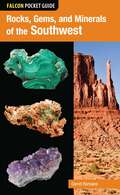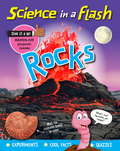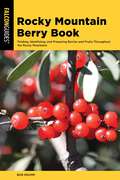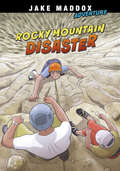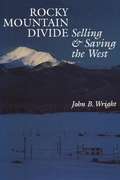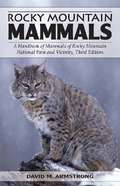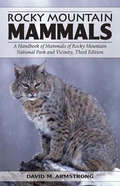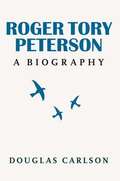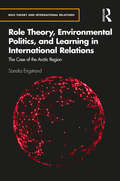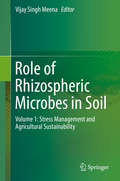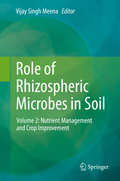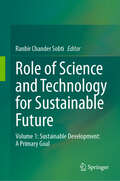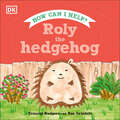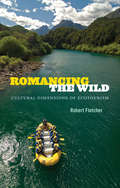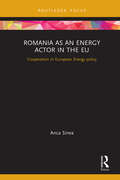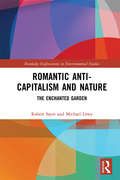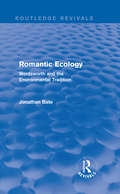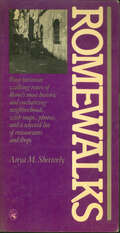- Table View
- List View
Rocks, Gems, and Minerals of the Southwest (Falcon Pocket Guides)
by Garret RomaineRocks, Gems, and Minerals of the Southwest is a field guide to more than 100 of the most common and sought-after rocks, gems, and minerals hidden throughout the Southwest. Conveniently sized to fit in your pocket and featuring full-color, detailed photographs, this informative guide makes it easy to identify rocks in your backyard and beyond. Also included is an introduction that covers fundamental geology information and interesting facts. This is the essential source when you're out in the field, both informative and beautiful to peruse.
Rocks, Gems, and Minerals of the Southwest (Falcon Pocket Guides)
by Garret RomaineRocks, Gems, and Minerals of the Southwest is a field guide to more than 100 of the most common and sought-after rocks, gems, and minerals hidden throughout the Southwest. Conveniently sized to fit in your pocket and featuring full-color, detailed photographs, this informative guide makes it easy to identify rocks in your backyard and beyond. Also included is an introduction that covers fundamental geology information and interesting facts. This is the essential source when you're out in the field, both informative and beautiful to peruse.
Rocks: Rocks Science ... In A Flash: Rocks (Science in a Flash #37)
by Georgia Amson-BradshawHelp kids discover science - in a flash!Science really rocks! If you're feeling ignorant about igneous, or muddled about metamorphic rocks, read this book. You'll soon recognise a slate from a sandstone, and understand all about fossil formation.This essential KS2 series for children aged 7 and up covers all the key science topics in energetic, quick-fire way, aiding clear comprehension by getting straight to the point! Each spread starts with a 'flash' or headline, summing-up succinctly the science information to follow. Attractive and light-hearted illustration visually conveys the information, adding depth and detail to engage children. Also includes fun jokes and cartoons to keep even the most reluctant readers entertained.
Rocky Mountain Berry Book: Finding, Identifying, and Preparing Berries and Fruits Throughout the Rocky Mountains (Nuts and Berries Series)
by Bob KrummThe Rocky Mountain Berry Book combines the information of a field guide and the fun of a cookbook. Learn to identify 16 berry and fruit species using non-technical descriptions, habitat hints, and color photos.
Rocky Mountain Disaster (Jake Maddox Adventure)
by Jake MaddoxTwelve-year-old Carly has recently recovered from an illness and to celebrate, Carly, her older brother, Ajay, and her dad go on a climbing trip in the Rocky Mountains. Even though Carly tries to convince her family she is a hundred-percent better, her troubling bouts of tiredness give her away. When an unexpected injury forces Carly and Ajay back down the mountain, Carly’s health is put to the ultimate test.
Rocky Mountain Divide: Selling and Saving the West
by John B. WrightThe opposing forces of conservation and development have shaped and will continue to shape the natural environment and scenic beauty of the American West. Perhaps nowhere are their opposite effects more visible than in the neighboring states of Colorado and Utah, so alike in their spectacular mountain environments, yet so different in their approaches to land conservation. This study explores why Colorado has over twenty-five land trusts, while Utah has only one. John Wright traces the success of voluntary land conservation in Colorado to the state's history as a region of secular commerce. As environmental consciousness has grown in Colorado, people there have embraced the businesslike approach of land trusts as simply a new, more responsible way of conducting the real estate business. In Utah, by contrast, Wright finds that Mormon millennialism and the belief that growth equals success have created a public climate opposed to the formation of land trusts. As Wright puts it, "environmentalism seems to thrive in the Centennial state within the spiritual vacuum which is filled by Mormonism in Utah. " These findings remind conservationists of the power of underlying cultural values that affect their efforts to preserve private lands.
Rocky Mountain Mammals, Third Edition
by David M. ArmstrongRevised, updated, and with more than 80 new color photographs, Rocky Mountain Mammals, Third Edition is a nontechnical guide to the mammals of the Southern Rocky Mountains and their foothills, with special emphasis on Rocky Mountain National Park and vicinity. Designed for quick reference and enjoyable reading, Rocky Mountain Mammals offers what most field guides don't - a wealth of fascinating information about each species. In seventy-two species accounts, David M. Armstrong describes each animal and its signs, habits, habitat, and natural history, noting times when seasonal events such as elk sparring occur. Introductory materials and appendices offer rich context and wildlife-watching support, including a checklist with page numbers for quick field reference, an identification key, a glossary, derivations of scientific names, and advice on how, when, and where to watch mammals. Armstrong introduces mammalian evolution, anatomy, and distribution and offers perspective on how the local fauna fits into its geographical setting and into past and potential future faunas of the region. This lavishly illustrated new edition will delight those who live in and visit the high country and foothills of the Southern Rockies and want to identify mammals and learn about their lives.
Rocky Mountain Mammals: A Handbook of Mammals of Rocky Mountain National Park and Vicinity, Third Edition (G - Reference, Information And Interdisciplinary Subjects Ser.)
by David M. ArmstrongRevised, updated, and with more than 80 new color photographs, Rocky Mountain Mammals, Third Edition is a nontechnical guide to the mammals of the Southern Rocky Mountains and their foothills, with special emphasis on Rocky Mountain National Park and vicinity. Designed for quick reference and enjoyable reading, Rocky Mountain Mammals offers what most field guides don't - a wealth of fascinating information about each species. In seventy-two species accounts, David M. Armstrong describes each animal and its signs, habits, habitat, and natural history, noting times when seasonal events such as elk sparring occur. Introductory materials and appendices offer rich context and wildlife-watching support, including a checklist with page numbers for quick field reference, an identification key, a glossary, derivations of scientific names, and advice on how, when, and where to watch mammals. Armstrong introduces mammalian evolution, anatomy, and distribution and offers perspective on how the local fauna fits into its geographical setting and into past and potential future faunas of the region. This lavishly illustrated new edition will delight those who live in and visit the high country and foothills of the Southern Rockies and want to identify mammals and learn about their lives. Published in association with the Rocky Mountain Nature Association.
Rocky Mountain National Park
by Phyllis J. PerryRocky Mountain National Park is often called "the crown jewel" of the nation's park system. Set in Colorado in the southern part of the Rocky Mountain chain, which forms the backbone of North America, the park contains 72 named peaks above 12,000 feet with the tallest of these, Longs Peak, rising to 14,259 feet. Established in 1915 as a national park, it now hosts more than two million visitors every year. Vacationers enjoy picnicking, hiking, camping, climbing, skiing, and simply admiring the beauties of the park, which include alpine plants, wildflowers, aspen, conifers, lakes, streams, waterfalls, and an abundance of birds and animals.
Roger Tory Peterson
by Douglas CarlsonBeginning with his 1934 Field Guide to the Birds, Roger Tory Peterson introduced literally millions of people to the pleasures of observing birds in the wild. His field guide, which has gone through five editions and sold more than four million copies, fostered an appreciation for the natural world that set the stage for the contemporary environmental movement. When Rachel Carson's Silent Spring sounded a warning about the threat to birds and their habitats in the 1960s, the Peterson field guides had already prepared the public and the scientific community to heed the warning and fight to save habitat and protect endangered species-a result that Peterson wholeheartedly approved. In this authoritative, highly readable biography of Roger Tory Peterson (1908-1996), Douglas Carlson creates a fascinating portrait of the complex, often conflicted man behind the brand name. He describes how Peterson's obsession with birds began in boyhood and continued throughout a multifaceted career as a painter, writer, educator, environmentalist, and photographer. Carlson traces Peterson's long struggle to become both an accomplished bird artist and a scientific naturalist-competing goals that drove Peterson to work to the point of exhaustion and that also deprived him of many aspects of a normal personal life. Carlson also records Peterson's many lasting achievements, from the phenomenal success of the field guides, to the bird paintings that brought him renown as "the twentieth century's Audubon," to the establishment of the Roger Tory Peterson Institute to carry on his work in conservation and education.
Rogue Wave: And Other Red-blooded Sea Stories
by Theodore TaylorThis riveting collection of sea stories spans the oceans of the world and the decades of the twentieth century. Full of action and adventure, these page-turning stories offer a compelling portrait of the dangers, the challenges, and the lessons of life at sea. "Nobody writes sea stories like Taylor, and this collection of eight tales should satisfy his many fans."--School Library Journal
Role Theory, Environmental Politics, and Learning in International Relations: The Case of the Arctic Region (Role Theory and International Relations)
by Sandra EngstrandIn this book, Sandra Engstrand uses role theory to study learning processes in environmental policy negotiations in the Arctic Council. Owing to rapid ice-melting in the Arctic region, and more accessible commercial opportunities, there is a greater need for environmental protection. However, large sections of the Arctic fall under state jurisdiction, often causing tensions to arise that prevent any cooperation from achieving fully efficient environmental protection. To enhance our understanding on how states learn about environmental norms, Engstrand examines negotiation processes on environmental protection for the prevention of Arctic marine oil spills and the reduction of short-lived climate pollutants. Through interviews with state representatives and through text analyses of nearly twenty years of meetings between Senior Arctic Officials from each of the eight Arctic states, Engstrand suggests that learning on environmental norms runs firstly through a learning of roles in international relations. She demonstrates how member states develop through self-reflection and by considering the expectation of others, concluding that states’ wishes to preserve their social role in a group and to be perceived as Arctic ‘cooperators’ are drivers for a social education on environmental norms. A timely and unmatched volume Role Theory, Environmental Politics, and Learning in International Relations will engage students and academic researchers in international relations, environmental governance, and Arctic politics.
Role of Rhizospheric Microbes in Soil: Volume 2: Nutrient Management And Crop Improvement
by Vijay Singh MeenaIn any ecosystem, plant and microbe interaction is inevitable. They not only co-exist but also support each other’s survival and provide sustenance in stressful environments. Agro-ecosystems in many regions around the globe are affected by high temperatures, soil salinity/alkalinity, low pH and metal toxicity. High salinity and severe draught are other major constraints affecting agricultural practices and also plants in the wild. A major limiting factor affecting global agricultural productivity is environmental stresses. Apart from decreasing yield, they also have a devastating impact on plant growth. Plants battle with various kind of stresses with the help of symbiotic associations with the rhizospheric microbes. Naturally occuring plant-microbe interactions facilitate the survival of plants under these stressful conditions.The rhizosphere consists of several groups of microbes, plant growth-promoting bacteria (PGPB) is one such group of microbes that assists plants in coping with multiple stresses and also promote plant growth. These efficient microbes support the stress physiology of the plants and can be extremely useful in solving agricultural as well food- security problems.This book provides a detailed, holistic description of plant and microbe interaction. It elucidates various mechanisms of nutrient management, stress tolerance and enhanced crop productivity in the rhizosphere, discussing The rhizospheric flora and its importance in enhancement of plant growth, nutrient content, yield of various crops and vegetables as well as soil fertility and health. Divided into two volumes, the book addresses fundamentals, applications as well as research trends and new prospects for agricultural sustainability. Volume 1: Stress Management and Agricultural Sustainability, includes chapters offering a broad overview of plant stress management with the help of microbes. It also highlights the contribution of enzymatic and molecular events occurring in the rhizosphere due to plant microbe interactions, which in turn help in the biological control of plant disease and pest attacks. Various examples of plant microbe interaction in rhizospheric soil are elaborated to facilitate the development of efficient indigenous microbial consortia to enhance food and nutritional security. Providing a comprehensive information source on microbes and their role in agricultural and soil sustainability, this timely research book is of particular interest to students, academics and researchers working in the fields of microbiology, soil microbiology, biotechnology, agronomy, and the plant protection sciences, as well as for policy makers in the area of food security and sustainable agriculture.
Role of Rhizospheric Microbes in Soil: Volume 2: Nutrient Management and Crop Improvement
by Vijay Singh MeenaIn any ecosystem, plant and microbe interaction is inevitable. They not only co-exist but also support each other’s survival and also provide for sustenance in stressful environment. Agro-ecosystems of many regions around the globe are affected by multi-stress. Major limiting factors affecting the agricultural productivity worldwide are environmental stresses. Apart from decreasing yield they introduce devastating impact on plant growth as well. Plants battle with various kind of stresses with the help of symbiotic association with the microbes in the rhizosphere. Naturally existing plant-microbe interaction facilitates survival of plants under these stressful conditions. Rhizosphere consists of many groups of microbes, plant growth-promoting bacteria (PGPB) is one such group of microbes which assist plants in coping with multiple stresses and in plant growth as well. These microbes help in stress physiology of the plants and can be extremely useful in solving agricultural as well food security problems. The proposed book is split into two parts, with an aim to provide comprehensive description and highlight a holistic approach. It elucidates various mechanisms in rhizosphere of nutrient management, stress tolerance and enhanced crop productivity. The book discusses rhizospheric flora and its importance in enhancement of plant growth, nutrient content, yield of various crops and vegetables as well as soil fertility and health. Both volumes of the book addresses fundamentals, applications as well as research trends and new prospects of agricultural sustainability. Volume 2: Nutrient Management and Crop Improvement, contains chapters which cover a broad overview of plant growth promoting activities of microbes. This proposed book also highlights the contribution of nitrogen, phosphorus, potassium, iron and zinc-solubilizing microbes from rhizospheric soil to develop efficient indigenous microbial consortia to enhance the food and nutritional security. With the given content and layout the proposed book will be an all-inclusive collection of information, which will be useful for students, academicians, researchers working in the field of rhizospheric mechanisms, agricultural microbiology, soil microbiology, biotechnology, agronomy and sustainable agriculture and also for policy makers in the area of food security and sustainable agriculture. It will be of special interest to both academics and professionals working in the fields of microbiology, soil microbiology, biotechnology and agronomy, as well as the plant protection sciences. Timely, this edited and research book provides an essential and comprehensive source of material from basic to advance findings on microbes and their role in agricultural and soil sustainability.
Role of Science and Technology for Sustainable Future: Volume 1: Sustainable Development: A Primary Goal
by Ranbir Chander SobtiThe book explores the pivotal role of science and technology in achieving the sustainable development goals (SDGs) outlined in the agenda 2030 for sustainable development. It emphasizes the importance of integrating science and technology into developing strategies to promote a sustainable and prosperous global future. The book highlights the universal acceptance of the SDGs by United Nations member states, subnational governing bodies, and international organizations. It emphasizes that all stakeholders, including governmental bodies, private enterprises, and civil society, have a responsibility to contribute to the achievement of the SDGs. Science, technology, and innovation are identified as the three pillars essential for achieving the SDGs. The book emphasizes the critical role of science and technology in addressing complex issues such as climate change, biodiversity loss, resource depletion, poverty reduction, health, education, gender equality, clean energy, sustainable cities, responsible consumption, and climate action. It helps to develop innovative solutions to promote economic growth, social inclusion, and environmental sustainability. And provide the necessary knowledge and tools to develop effective policies and strategies in these areas. Furthermore, the book highlights the potential of science and technology in promoting innovation and entrepreneurship, leading to the creation of new businesses and industries that align with sustainable development principles. This fosters economic growth, job creation, and environmental sustainability. It advocates for continued investment in science and technology and their integration into development strategies. The book aims to provide insights into the role of traditional and emerging areas of science and technology in meeting the goals outlined in the SDG document, with a specific focus on India. The book serves as a great source of information for researchers, teachers in basic and applied sciences /social sciences research and policymakers.
Rolf in the Woods: The Adventures of a Boy Scout with Indian Quonab and Little Dog Skookum
by Ernest Thompson SetonSet at the beginning of the nineteenth century, Rolf in the Woods follows a young boy on his journey to becoming a man, learning how to live in the wilderness, respecting animals and nature, and fighting amongst his brethren in war. When his mother passes away, fifteen-year-old Rolf goes to live with his aunt and uncle on their farm. But his aunt's constant scolding and his uncle's drunken violence make living in this new home unbearable for the gentle boy, and he runs away to live in a wigwam with Quonab, a Native American, and his trusty dog Skookum, who teach the boy how to live off the land, hunt, gather, and understand wild creatures. These newfound skills come into play when Rolf must participate in the War of 1812, and he is able to survive by relying on the wisdom the Indian has shared with him. Rolf in the Woods is not only an adventure story but also a guide that teaches young men how to thrive in the outdoors. Ernest Thompson Seton, an avid outdoorsman, provides vivid descriptions of Quonab's lessons, like making a bed with logs, constructing a tom-tom, distinguishing the calls of animals, and making a bow and arrow, and includes over 200 hand-drawn illustrations to make these lessons come to life.
Roly the Hedgehog (Roly and Friends)
by Frances RodgersLet your little nature lover learn how to help the adorable animals that like to visit your yard.Meet Roly. She&’s a curious, prickly hedgehog who loves to explore yards, including yours! The yard can often be a dangerous place, and Roly needs your help to face these challenges. Are you in?This illustrated children&’s book about nature is perfect for gently introducing young readers to the idea of animal conservation and protection. It includes: • Beautifully illustrated spreads. • An engaging storyline that kids can follow and relate to, as the book refers to the wildlife that can be found in their own backyard or garden. • Fun-filled facts about hedgehogs. • A thoughtful and timely message about protecting wildlife, with tips for doing so. Join Roly on a garden adventure of a lifetime! Bursting with fun trivia and colorful illustrations, this sweet animal picture book shows kids just how unique hedgehogs are, which makes them worth preserving. Perfect for children ages 3-5, this wonderful preschool book provides animal-loving toddlers with plenty of helpful tips and tricks to help keep all their garden guests safe and roaming freely. It&’s the ultimate gift for curious children or budding environmentalists.Roly the Hedgehog is part of a beautiful series from DK that aims to inspire youngsters to discover so much of what is unseen in their yards, and teach them how to care for their yard-dwelling friends. Other titles in this series include Rory the Garden Bird, Roxy the Butterfly and Rosy the Bumblebee.
Romancing the Wild: Cultural Dimensions of Ecotourism
by Robert FletcherThe worldwide development of ecotourism—including adventures such as mountain climbing and whitewater rafting, as well as more pedestrian pursuits such as birdwatching—has been extensively studied, but until now little attention has been paid to why vacationers choose to take part in what are often physically and emotionally strenuous endeavors. Drawing on ethnographic research and his own experiences working as an ecotour guide throughout the United States and Latin America, Robert Fletcher argues that participation in rigorous outdoor activities resonates with the particular cultural values of the white, upper-middle-class Westerners who are the majority of ecotourists. Navigating 13,000-foot mountain peaks or treacherous river rapids demands deferral of gratification, perseverance through suffering, and a willingness to assume risks in pursuit of continuous progress. In this way, characteristics originally cultivated for professional success have been transferred to the leisure realm at a moment when traditional avenues for achievement in the public sphere seem largely exhausted. At the same time, ecotourism provides a temporary escape from the ostensible ills of modern society by offering a transcendent "wilderness" experience that contrasts with the indoor, sedentary, mental labor characteristically performed by white-collar workers.
Romania as an Energy Actor in the EU: Cooperation in European Energy policy (Europa Perspectives on the EU Single Market)
by Anca SineaThe purpose of this book is twofold. First, it aims to explain the general framework for cooperation in the energy sector in Europe, with a conceptual basis that allows for a better understanding of the dynamics that led to its existence. Second, the volume deals with Romania both as a representative case for the region, given the commonalities raised by the transition process in the last three decades, and also as a country with a specific energy agenda, with implications for internal and foreign policy that can only be perceived and understood in the Romanian context.
Romantic Anti-capitalism and Nature: The Enchanted Garden (Routledge Explorations in Environmental Studies)
by Michael Löwy Robert SayreRomantic Anti-capitalism and Nature examines the deep connections between the romantic rebellion against modernity and ecological concern with modern threats to nature. The chapters deal with expressions of romantic culture from a wide variety of different areas: travel writing, painting, utopian vision, cultural studies, political philosophy, and activist socio-political writing. The authors discuss a highly diverse group of figures - William Bartram, Thomas Cole, William Morris, Walter Benjamin, Raymond Williams, and Naomi Klein - from the late eighteenth to the early twenty-first century. They are rooted individually in English, American, and German cultures, but share a common perspective: the romantic protest against modern bourgeois civilisation and its destruction of the natural environment. Although a rich ecocritical literature has developed since the 1990s, particularly in the United States and Britain, that addresses many aspects of ecology and its intersection with romanticism, they almost exclusively focus on literature, and define romanticism as a limited literary period of the late eighteenth and early nineteenth centuries. This study is one of the first to suggest a much broader view of the romantic relation to ecological discourse and representation, covering a range of cultural creations and viewing romanticism as a cultural critique, or protest against capitalist-industrialist modernity in the name of past, pre-modern, or pre-capitalist values. This book will be of great interest to students and scholars of ecology, romanticism, and the history of capitalism.
Romantic Ecology: Wordsworth and the Environmental Tradition (Routledge Revivals)
by Jonathan BateFirst published in 1991, Romantic Ecology reassesses the poetry of William Wordsworth in the context of the abiding pastoral tradition in English Literature. Jonathan Bate explores the politics of poetry and argues that contrary to critics who suggest that the Wordsworth was a reactionary who failed to represent the harsh economic reality of his native Lake District, the poet’s politics were fundamentally ‘green’. As our first truly ecological poet, Wordsworth articulated a powerful and enduring vision of human integration with nature which exercised a formative influence on later conservation movements and is of immediate relevance to great environmental issues today. Challenging the orthodoxies of new historicist criticism, Jonathan Bate sets a new agenda for the study of Romanticism in the 1990s.
Romantic Things: a tree, a rock, a cloud
by Mary JacobusOur thoughts are shaped as much by what things make of us as by what we make of them. Lyric poetry is especially concerned with things and their relationship to thought, sense, and understanding. In Romantic Things, Mary Jacobus explores the world of objects and phenomena in nature as expressed in Romantic poetry alongside the theme of sentience and sensory deprivation in literature and art. Jacobus discusses objects and attributes that test our perceptions and preoccupy both Romantic poetry and modern philosophy. John Clare, John Constable, Rainer Maria Rilke, W. G. Sebald, and Gerhard Richter make appearances around the central figure of William Wordsworth as Jacobus explores trees, rocks, clouds, breath, sleep, deafness, and blindness in their work. While she thinks through these things, she is assisted by the writings of Maurice Merleau-Ponty, Jacques Derrida, and Jean-Luc Nancy. Helping us think more deeply about things that are at once visible and invisible, seen and unseen, felt and unfeeling, Romantic Things opens our eyes to what has been previously overlooked in lyric and Romantic poetry.
Rome
by Spiro Kostof Rabun Taylor Rinne Katherine WentworthSpanning the entire history of the city of Rome from Iron Age village to modern metropolis, this is the first book to take the long view of the Eternal City as an urban organism. Three thousand years old and counting, Rome has thrived almost from the start on self-reference, supplementing the everyday concerns of urban management and planning by projecting its own past onto the city of the moment. This is a study of the urban processes by which Rome's people and leaders, both as custodians of its illustrious past and as agents of its expansive power, have shaped and conditioned its urban fabric by manipulating geography and organizing space; planning infrastructure; designing and presiding over mythmaking, ritual, and stagecraft; controlling resident and transient populations; and exploiting Rome's standing as a seat of global power and a religious capital.
Romewalks
by Anya M. ShetterlyThe secret of all cities is to be found in their streets and neighborhoods. This is especially true of Rome. What distinguishes this guidebook to Rome from so many others is that it explores neighborhoods instead of merely describing monuments. By taking the reader on walks through the streets around the Campo dei Fiori, the Piazza Noavona, the Jewish Ghetto, and Trastevere, and by paying close attention to architecture, local history and people, art, religion, archeology, and, of course, cuisine, Romewalks by Anya M. Shetterly offers a remarkably intimate and comprehensive look at the city and its history. Also included in this guidebook are maps of each of the four walks, photographs, a concise section of information and advice, a list of specially selected restaurants and shops, and an index.
